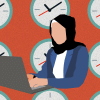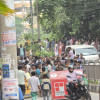Why online classes during Ramadan should be the standard

Most people who have to commute regularly with Dhaka's abysmal traffic have accepted their fate and made as much peace with it as possible. However, traffic during Ramadan is a special form of torture from the deepest corners of hell. During Ramadan, the unpredictability of traffic and the long, hot days sitting under a scorching sun, praying for the signal to be left open long enough for the vehicle to pass is especially trying. But is this fate completely unavoidable for all?
Unlike previous years, most schools, universities, and other educational institutions have remained open during Ramadan this year. As the timing of Ramadan coincided with a more critical time for schools than usual, it has been difficult for schools to accommodate a vacation throughout the month. However, what makes it unacceptable is not opting for online classes.
It has already been established during the Covid lockdown period that online classes are not an outrageous last resort but an effective mode of learning, if done right. Though online classes have their own drawbacks, expecting students to maintain their usual level of performance while getting through the unbearable heat and spending extra hours on the road to get to and from classes, regardless of their faith, is inhumane.
Most schools are preparing for end of term or year exams, due to which they have decided to keep their school open for mocks and revisions through all grades and ages. But would it not have been possible for these revision classes to take place online? Not only would it allow students to save their energy from the commute, and their families to spend less time on the street starting very early in the day, but it would also allow teachers the commute and the hassle of regulating an in-person classroom where they often have to speak at a higher volume to grab the attention of young and distracted children.
Moreover, school commencement and dismissal timings are much closer to updated Ramadan office hours, making the traffic infinitely worse both early in the morning and before iftar. Meaning that not only do most people have to start for their work or school much earlier than they need to, which is a difficult task on its own for people who go to sleep after sehri and fajr prayers, and reach home barely in time for iftar, if at all.
In the case of university students, attending classes during Ramadan becomes slightly more difficult. Where schools adhere to specific dismissal times, usually during high noon, university students have to deal with classes that can end in the afternoon. While some universities take the initiative to end classes before 4pm, the horrific traffic situation makes the shortened class hours virtually redundant. Students often have to resort to breaking their fast on the road if their usual commute takes more than an hour.
Apart from the timings, university students have to juggle quizzes, midterms, report submissions, and even extra classes during Ramadan, making their schedules all the more draining. The academic pressure, coupled with draining commutes and barely any time for sleep, makes the idea of physical classes all the more terrible.
But, as we have learned from the pandemic, it does not necessarily have to be that way. For most universities, online classes have proven to be a success. With the exception of exams, most university lectures can easily be conducted online, without the need to make changes to the academic calendars. University classes being shifted online would not only go a long way to minimise the horrendous traffic situation, but it would also allow many students living away from their families to go back home and celebrate this month of festivities with their families.
Dhaka traffic is an unfortunate part of reality for those who have to succumb to it, but it begs the question: does everyone spending precious hours on the road during Ramadan have to be there? Or is there a better way to deal with this?

 For all latest news, follow The Daily Star's Google News channel.
For all latest news, follow The Daily Star's Google News channel. 








Comments